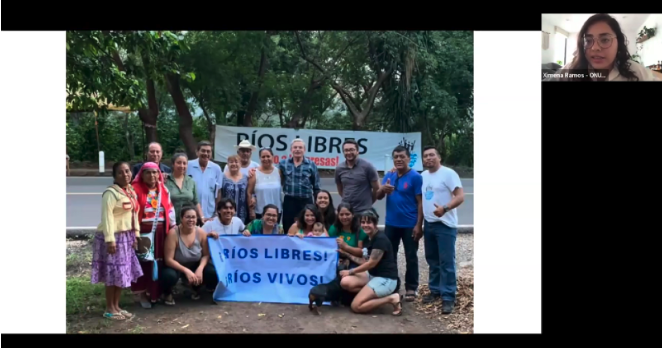News & Blogs
We launched the Environmental and Climate Justice Lab in Latin America!
*Haz clic aquí para leer en español.
Why a Learning Lab?
If we want to find alternatives to overcome the socio-environmental crisis that we are facing, we need to think and act differently. Although there is a certain consensus about the need to adjust the course of action, as organizations and people who work to advance environmental justice and natural resource governance, we usually find ourselves repeating the same formulas, and reproducing the very same power dynamics that we want to fight.
Those of us who work in environmental and land defense alongside impacted communities know that we work in a context of urgency, marked by violence and inequality, and with little margin for reflection, strategic thinking, and peer-to-peer learning. At the same time, most of the existing training or educational spaces are not designed with these work and contexts in mind. Instead, they respond to traditional logics based in vertical and academic knowledge.
These are the reflections that bring the Grassroots Justice Network in Latin America, and the Escuela Latinoamericana de Abogacía Comunitaria y Activismo Jurídico (ELAC) to design a different educational space which responds to those realities, and puts practical and experiential learning at the centre.
Which is the differentiated contribution of the Lab?
We believe that when those who defend the environment, land and natural resources get together, dialogue, and share experiences, we can generate collective learning of great pedagogical and practical value, that is usually lacking in traditional training spaces.
The Environmental and Climate Learning Lab for Latin America emerges from these reflections, with the support of Global Affairs Canada, and in connection with an ambitious learning agenda supported by the International Development Research Centre (IDRC). The Lab is a unique collective learning space based in the exchange of knowledge and experiences about the transformative use of the law in processes to defend the environment, land, and natural resources.
It departs from the following premise: to reverse the logic under which traditional learning spaces operate, in order to open up a trust-based space where participants can bring their experiences, projects, ideas, knowledge or doubts. From there, we start a collective reflection, exchange and feedback exercise.
What do we aim to address?
The Lab is structured along four elements, which we consider are key to any environmental defence process: 1) how to analyze and document socio-environmental conflicts; 2) legal and political tools to use in our advocacy efforts; 3) how to communicate the socio-environmental and climate crisis; and 4) how to engage with each other to strengthen environmental defence movements.
Beyond bringing legal knowledge to participants, the Lab aims to generate reflections regarding the role that the law plays (and can play) in environmental defence processes: its potential, its limitations, how it can play a transformative role, and, in particular, the role that we have as practitioners and activists who aim to contribute to the use of the law as a tool for environmental defense.
This collective exchange and learning through dialogue aims to contribute to broader reflections about the importance of transforming the norms, institutions, and law in itself in Latin America, so that they effectively respond to the needs of communities impacted by environmental injustices, and become an ally in their environmental fights.
Who is participating in the Lab, and which learnings or debates are emerging so far?
14 people from 5 countries in the region participate in this first edition of the Learning Lab. From civil society organization’s staff, to community leaders and activists, to law students and lawyers.
During the Lab’s first two sessions participants shared about their work and the main socio-environmental issues that that they are facing. This led to a conversation about what we understand by climate and environmental justice. We collectively built a decalogue to address the socio-environmental and climate crisis, of which the following point stands out:
“We have to focus on the richness of Indigenous Peoples. Their rights and innate care for nature. We must build our capacities and push for collective educational public policies through civil society organizations, and engage with state organisms to enhance knowledge and care for the common good.”
We also had the opportunity to discuss with Ximena Ramos Pedrueza Ceballos, Professor at the Ibero-American University’s “Bertha Cáceres” Legal Clinic. Ximena shared about her own experiences accompanying environmental defence processes through strategic litigation.
“We establish links with the communities that we have the possibility to accompany through sensitivity, transparency, and empathy. It is key to include them in the whole process, as the different knowledges are complementary. As lawyers, we become translators of their demands to the legal knowledge.”

Ximena Ramos during one of the Lab’s sessions
We are excited to share with you the first steps of this Learning Lab. We are grateful to those who joined the Lab as participants and guest speakers for trusting us and joining this space to imagine different futures for our region. Stay tuned for more updates from this group!
If you want to know more about the Grassroots Justice Network learning and other opportunities you can subscribe to our newsletter here.*If you want to receive global updates about our land & environmental justice work you can tick the box “I want to receive a monthly newsletter about land and environmental justice”. If you indicate a country in Latin America, you will also receive updates about our work in the region.
If you want to know more about the Escuela Latinoamericana de Abogacía Comunitaria y Acivismo Juírico (ELAC), you can subscribe to the School’s newsletter here.
SHARE THIS:
